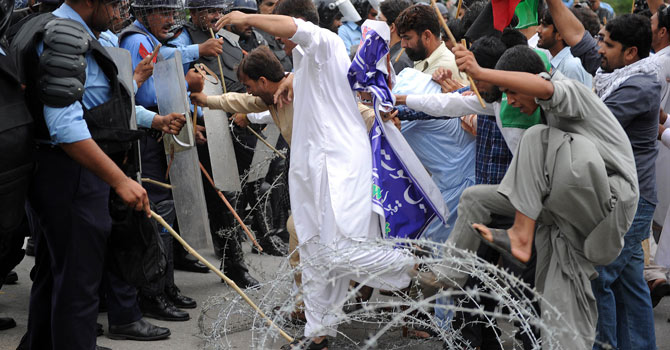A US appeals court on Wednesday ordered Google Inc. to remove from its YouTube video-sharing website an anti-Islamic film that had sparked protests across the Muslim world.
By a 2-1 vote, a panel of the 9th US Circuit Court of Appeals on Wednesday rejected Google's assertion that the removal of the film “Innocence of Muslims,” amounted to a prior restraint of speech that violated the US Constitution.
The plaintiff, Cindy Lee Garcia, had objected to the film after learning that it incorporated a clip she had made for a different movie, which had been partially dubbed.
Representatives for Google could not immediately be reached for comment.
Cris Armenta, a lawyer for Garcia, said she is delighted with the decision.
“Ordering YouTube and Google to take down the film was the right thing to do,” Armenta said in an email.
“The propaganda film differs so radically from anything that Ms Garcia could have imagined when the director told her that she was being cast in the innocent adventure film.”
The controversial film sparked a torrent of anti-American unrest among Muslims in Egypt, Libya, Pakistan and other countries in 2012.
That outbreak coincided with an attack on US diplomatic facilities in Benghazi that killed four Americans, including the US ambassador to Libya. US and other foreign embassies were also stormed in the Middle East, Asia and Africa.
The made-in-America trailer for the movie, which has never reached cinemas, provoked uproar throughout the Muslim world, and several US diplomatic missions were targeted. In Pakistan, clashes between police and protesters left 19 people dead.
YouTube as well as Facebook were initially blocked although the government soon exempted Facebook, saying it removed the offensive material.
For many Muslims, any depiction of Prophet Muhammad (PBUH) is considered blasphemous.
Google had refused to remove the film from YouTube, despite pressure from the White House and others, though it blocked the trailer in Egypt, Libya and certain other countries.
Garcia had claimed that her performance within the film was independently copyrightable and that she retained an interest in that copyright. A lower court had refused her request that Google remove the film from YouTube.
But in Wednesday's decision, 9th Circuit Chief Judge Alex Kozinski said Garcia was likely to prevail on her copyright claim and having already faced “serious threats against her life,” faced irreparable harm absent an injunction.
He called it a rare and troubling case, given how Garcia had been duped.
“It's disappointing, though perhaps not surprising, that Garcia needed to sue in order to protect herself and her rights,” he wrote.















































